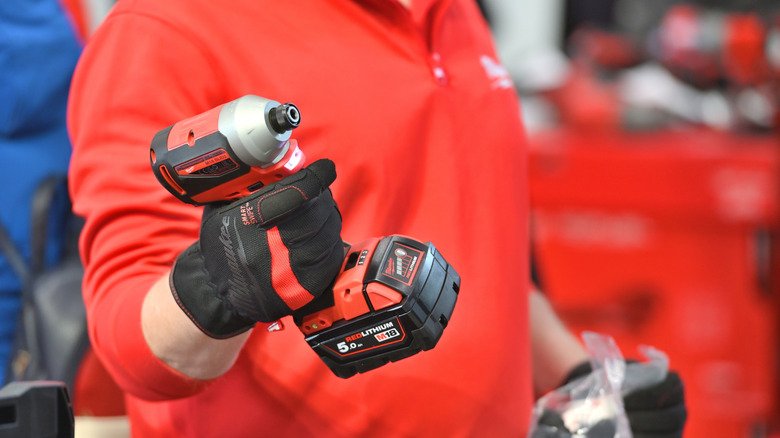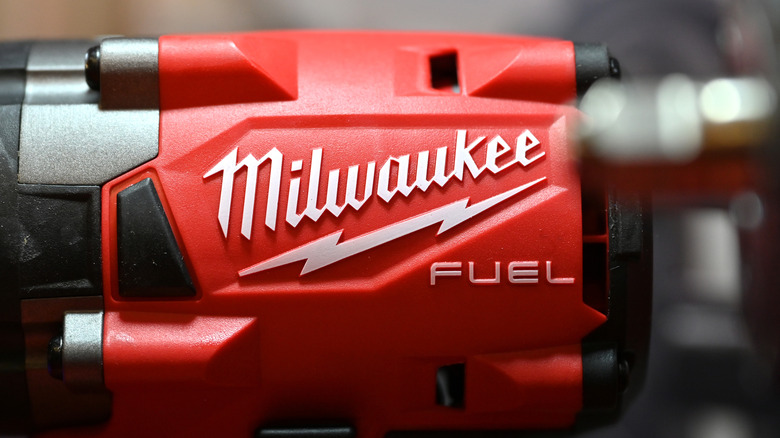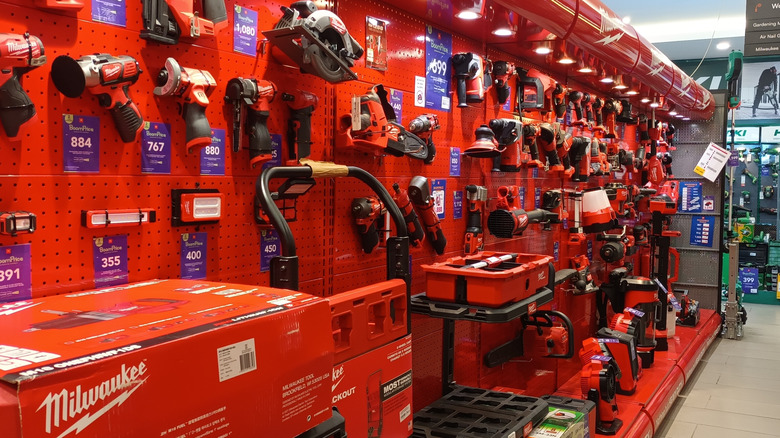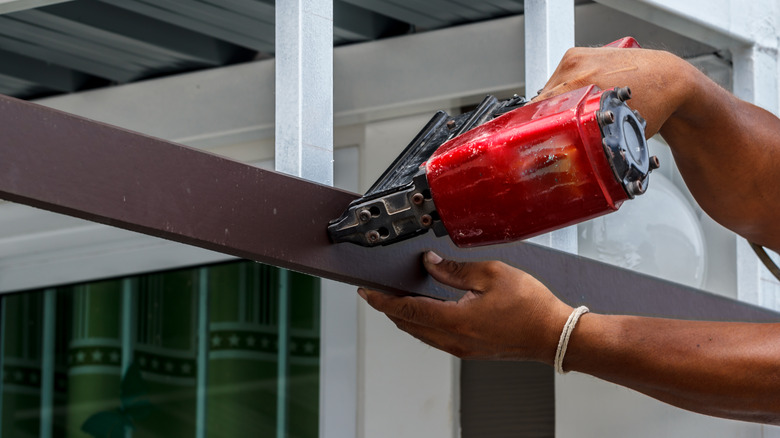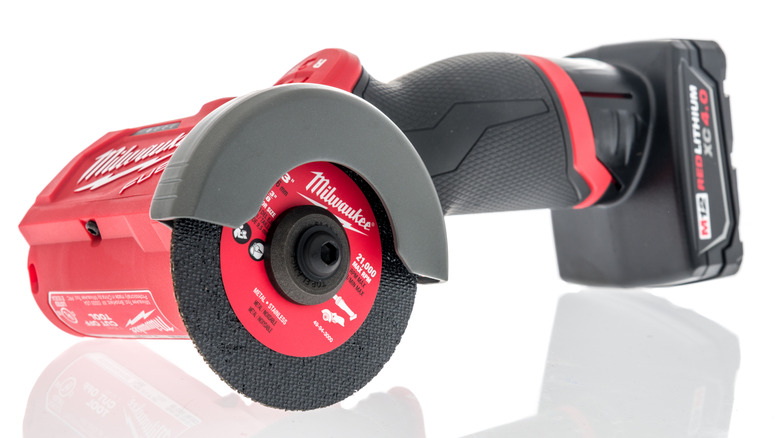5 Honest Reasons Why So Many Tool Enthusiasts Love Milwaukee
Anyone with even a passing familiarity with the major power tool brands, will know and probably have at least some experience with Milwaukee equipment. The brand launched its first tool offerings just over a century ago, and throughout the company's history, innovation and a care for the tools themselves have been a central theme.
Sure, everyone will have their own preferences, and some may gravitate toward alternative brands to support their needs. Milwaukee isn't a one-stop solution for every job requirement you'll encounter, and there are plenty of things to consider before investing in Milwaukee gear. With that being said, there's a very large cadre of tool users who swear by the red and black brand. I'm among that group, with numerous Milwaukee tools across its catalog including hand tools and both M12 and M18 powered units.
My own experience with the Milwaukee tool list was central to this evaluation of the brand, but it also provided an interesting framework for conversation with other Milwaukee users. In reaching out to friends, colleagues, and professionals in the trades that I've encountered in the past, some of the best aspects of Milwaukee tools and equipment come sharply into focus. I spoke with a handful of people who predominantly reach for Milwaukee tools when performing installations or repairs. As a result, all claims in this article come from interviews conducted with real-life Milwaukee tool users and long-time Milwaukee tool enthusiasts.
The power
Milwaukee tools frequently find themselves at or near the top end of power output compared to other brands. Among a few key specifics that pushed me toward it, rather than a competitor like Makita, was the punch the brand's impact driver delivers. In our research, Flex offers the best impact driver on the market, with Milwaukee at a close second. But beyond just this singular tool, Milwaukee gear frequently delivers excellent fastening, drilling, and cutting power that makes alternative builds feel like toys.
My father-in-law has long been primarily a Bosch power tool user. His driver and many other tools are made by the iconic German tool company. But even he has started to explore the Milwaukee ecosystem after using my tools on a few home renovation projects he lent a hand with around my house. In speaking with him about his newfound affinity for Milwaukee, the power output of my power tool compared to his own stood out the most. When you absolutely need to get a fastener in place or cut through something difficult to manage, he now prefers a Milwaukee tool over any other.
A huge catalog that covers virtually any need
Expanding the conversation, I reached out to a mechanic that I take my car to for tune ups and general service. He's a Milwaukee user as well, and I asked about the underlying reasons for his personal preference over DeWalt (another very common brand spotted in professionals' kits) or other solutions. The vast nature of the Milwaukee catalog was one of the standouts for him. As is the case with any cordless tool you might pick up, having the appropriate battery on hand makes a world of difference. Each brand operates its own specific build parameters, and so generally speaking they're not cross-compatible. It is worth noting though that Amazon brands and other builders have made tools specifically to work with Milwaukee batteries and the same can be said for other major brands).
Investing in a brand that makes a wide range of equipment isn't just a nice feature. It can mean the difference between buying a cost-effective bare tool and starting all over again with a battery and charger to support a single new tool requirement. Milwaukee makes well over 500 tools and 3,500 accessories. There are over 250 tools in the M18 battery ecosystem alone, allowing a single power source to operate an entire garage or workshop of essential equipment.
A focus on trade-specific tools and equipment
In 2024, ToolGuyd published a piece bout the success Milwaukee has enjoyed as a tool brand. "Disruptive innovation" was the outlet's key point of focus in exploring the massive growth Milwaukee has experienced in recent years. Rather than doubling down on tools that work well, Milwaukee has spent its modern life under the ownership of TTI (purchased in 2005 by the conglomerate) seeking to innovate and expand its offerings. This has led to numerous sub-sets of its tools, such as individual ratchet and socket set builds designed with individual trade needs in mind.
Part of my own decision to invest in Milwaukee equipment came as a result of specific tools offered by the brand, though the visibility of the equipment played a huge role in that decision, too. It would be incorrect to say otherwise. Specifically, Milwaukee has made itself useful to professional tradespeople in such a wide range of niche areas that it's common to see the gear on any sort of worksite. Seeing pros use the brand in such abundance builds an intrinsic legitimacy that slowly and subtly creates a potent selling point that flies under the radar. The more you see professionals using Milwaukee gear the more you trust the name when considering purchasing a tool for your own project. This built-in advertising resource was created piece by piece as Milwaukee equipment continued to expand into new trade areas and deliver reliable, job-specific equipment.
Genuinely useful small-bodied tools
People who don't often work with power tools can easily be surprised by the weight of even a standard piece of equipment. For instance, my SDS drill weighs somewhere in the neighborhood of 15 pounds. It's a tool used in elongated drilling and demolition work, and not one that's particularly easy to operate. Plenty of Milwaukee's mainline M18 tools are lighter than other options, and the brand's full sized SDS hammer drills are one such solution that even haters of the brand can get behind.
Milwaukee also makes a comprehensive range of M12 tools, featuring similar power outputs to the standard lineup but delivering that functionality is significantly scaled down tool bodies. In speaking with a longtime friend who also users Milwaukee tools, one of his most prominent points of praise was in the M12 range's ability to deliver both smaller equipment and ample power. Many small tools strive to act as dedicated replacements to their heavier counterparts but simply miss the mark. The Milwaukee range offers excellent replacement value in standard working conditions, reducing the level of fatigue experienced when working with the equipment for lengthy periods of time. On top of that, Milwaukee's M12 range also delivers enhanced ability to tackle jobs in tight spaces, and they serve exceedingly well in mobile tool kits that need to prioritize space-saving features. This makes them even more useful to a wide range of users.
The brand makes intuitive improvements that users want
My mechanic also noted that the brand does a pretty good job of listening to the needs of customers and tweaking products to accommodate buyers' real world usage needs. Actively exploring the areas that act as sticking points for Milwaukee tool owners helps it stay ahead of problems and remain a relevant presence in the tool market that supports the ongoing needs of professionals and DIYers alike. This might sound like a claim that's hard to really pin down, but others have also noted that Milwaukee appears to be actively engaged in a cyclical improvement process that takes user gripes into consideration.
VCG Construction posted a number of videos on YouTube a few years ago about an issue in the Milwaukee M18 Fuel Impact Driver. The generation 3 release, specifically, featured a retaining spring that didn't work properly, leading to an ability to lose the bit while pulling back on the tool. The VCG group first tried to fix the issue themselves, then later noted that Milwaukee had created a fix for the oversight and was repairing affected models and installing the update in new releases. A brand that's actively engaged with its customer base is one prepared to make changes when problems occur and model its new products off of the needs of their users. This makes Milwaukee not just a tool brand with gear that can perform well, but rather a potentially valuable partner in many user's tool journeys.
